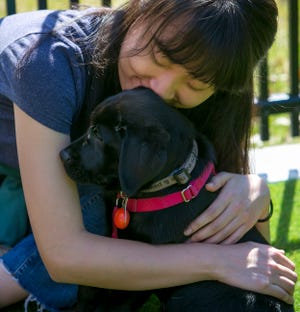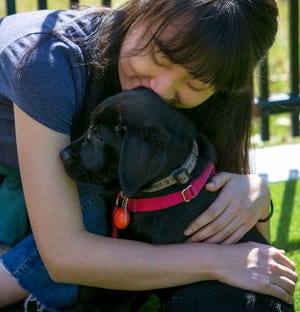
As we emerge from the pandemic and stumble, blinking into the light, some of us will fling ourselves back into our old lives without a backward glance. Some of us will need more time to transition. The same is true for our dogs.
The two biggest challenges dogs must overcome are how to be together and how to be alone. The challenges are extra difficult if they were born during the pandemic and have never learned to do either.
Dogs are famously social, and their strong bond with people has given dogs unique abilities to read our gestures, our intentions and sometimes our minds. During the pandemic, though, opportunities to meet strangers and make new canine and human friends disappeared overnight. Our dogs’ world, like our own, became small and insular.
COVID has been strange for dogs
Just like our muscles, mental patterns take time to form and strengthen. The return to normal, where dogs spend hours on their own then meet dozens of strangers when they go out, should not be like ripping off a Band-Aid. Dogs who have never spent more than an hour by themselves should not suddenly spend 40 hours a week alone. A dog who has never played with another dog cannot be let loose into a dog park without preparation.

Sudden flooding of this kind can lead to anxiety, aggression and behavioral problems such as harming other dogs or themselves, destroying furniture, or continuous barking or howling. Behavioral problems are the main reason dogs are relinquished to shelters, a devastating outcome for both dogs and their owners.
Preparing our dogs for the return to normal life should consist of regular, routine sessions, with gradually longer increments.
At the Duke Puppy Kindergarten, where we study the cognitive development of assistance dogs, before naptime or bedtime, we use the three w’s: Wear them out, wait for poop and watch them sleep.
Many canine behavioral problems are due to insufficient exercise. A 12-week-old puppy can build up to walking several miles a day and playing fetch for 15 minutes. We’ve found that if puppies are really, really tired at naptime, they stumble into their crate gratefully, flop down and close their eyes immediately. Their crate is like their den, a warm, safe place where they can relax and recharge without being disturbed.
Pandemic poverty hurts animals:Dogs, cats and people are in a housing crisis together
We’ve learned that while some puppies are quick poopers, others take their sweet time. Puppies need to poop five to seven times a day or more, and dogs need to go to the bathroom at least once every four hours. A dog who needs to go to the bathroom and can’t is an unhappy dog.
Reach out to other puppy parents
To monitor their progress when they’re alone, we stream the puppies via a baby monitor to our computers or phones. We watch for signs of anxious behaviors, such as whining, and note who is getting a little rough and might need more walks, or who is spending time under a bench and might need time by themselves.

So far we have raised nearly 30 puppies together with our team, which includes an experienced veterinary behaviorist and Ashton Roberts, one of the head trainers of Canine Companions, where the puppies will train to be service dogs.
Dogs and their noses:On K9 Veterans Day, honor heroic military working dogs for saving soldiers’ lives
Unlike a free-ranging dog mom, you do not need to do this alone, either. Your team can include a trainer, a dog walker, doggy day care and a veterinarian. You can reach out to other puppy parents to defray costs, provide moral support and exchange puppy-sitting duties. Once everyone is comfortable with the idea, the dog park is an excellent opportunity for both dogs and their parents to meet strangers and make friends.
Although some will be more ready to launch than others, the way to treat all our dogs is with patience and kindness. They deserve no less.
Brian Hare (@bharedogguy) is a professor of psychology and neuroscience at Duke University. Vanessa Woods (@bonobohandshake) is the director of the Duke Puppy Kindergarten. They are co-authors of the recent book “Survival of the Friendliest.”
